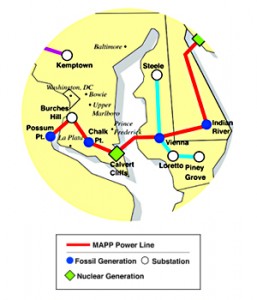Mid-Atlantic’s MAPP line cut short
May 20th, 2009
PJM, Delmarva Power, PEPCO, PHI, whatever, admit that demand is down and that the Mid-Atlantic Power Pathway, the transmission line through Maryland and Delaware to New Jersey, should be delayed
The Mid-Atlantic Power Pathway, or MAPP, is part of PJM’s “Project Mountaineer,” a web of lines expressly designed to move coal generation from the Amos plant in West Virginia and gather other coal and nuclear generation and send it in a northeasterly direction:
See the MAPP line there in the NE section of Project Mountaineer line 4?
PJM has recommended delay of the inservice date for a portion of the MAPP line by a year, the portion from Indian River to Salem nuclear plant. What remains, however, is a problem, because electrically, it makes no sense to build a 500kV radial line to nowhere. If part of the line should be delayed, the ENTIRE line should be delayed.
Here’s the corporate Press Release and two “articles” which should be compared!
Press Release from Delmarva site
MAPP: Controversial High Voltage Electric Transmission Line Delayed for One Year
PJM Reinforces MAPP Need: Adds Year to Schedule (states “contributed by Delmarva Power”)
This demonstration of lack of need is something that should be raised in the Delmarva Power IRP docket, that demand is down so significantly that PJM thinks infrastructure construction should be delayed. And yes, PJM demand is way, way down.
So, since demand is so far down, this is a good time to let the PSC know, in the Delmarva Power IRP docket, that we know that demand is down, so far down that they can’t cover anymore and they have to postpone some of their infrastructure construction. The Hearing Officer is taking public comments on the Delmarva Power IRP until some time in July, I think the 25th.
Send IRP Public Comments to the Hearing Eximaner Ruth Price:
What’s an IRP Comment? The Integrated Resource Planning process is supposed to be the way a utility plans ahead to cover their demand, and it’s essentially the intersection of energy policy and those #(%&*)#*( utilities. This is the arena where it’s determined whether they should meet their demand through conservation (the cheapest and environmentally the smallest footprint), efficiency steps like load shifting and SmartGrid, offshore wind paired with natural gas for backup, and whether external costs of various generation options are taken into account. SOOOOO, does that give you an idea of what’s up?
See Delmarva Power’s IRP docket at the PSC, scroll down beyond that rulemaking on the top:
And note this sly trick — they couldn’t get their IRP right from last cycle and were told by PSC staff to take it home and try again, and the last revision of that last IRP is the one they submitted:
And they said in their accompanying letter that this one should be for THIS cycle! AAAAAAARGH!
So, it’s time to review this joke of an IRP, take a look at PJM load forecasting, look at PJM and PEPCO SEC filings like their 2008 10-K and 2009 1st Quarter 10-Q:
Dig up some good conservation reports and sent them in as examples of what can be done. Let them know that with PJM demand down, we expect some changes, that this is a good opportunity to take a sustainable fork in the road, when demand is down we can make conscious choices.
Once more with feeling, check out the Delmarva Power IRP and send comments to ruth.price@state.de.us.


July 13th, 2009 at 8:41 pm
[…] Tell the PSC that it’s time Delmarva Power get serious about conservation, that we want coal plants shut down, that it’s time to get wind on line, and that we do NOT want the Mid-Atlantic Power Pathway transmission line (you know, that line that runs from coal plants SW of Delaware, up through Indian River and to Salem. PJM admits that the Indian River to Salem part of it is not needed, and it’s time to get the WHOLE truth out, that the entire line is not needed. See Mid-Atlantic MAPP line cut short). […]